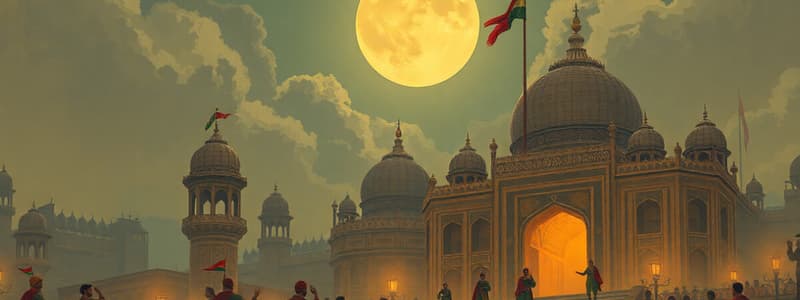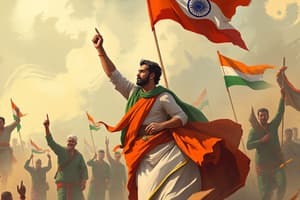Podcast
Questions and Answers
Which event marked the formation of the Indian National Congress?
Which event marked the formation of the Indian National Congress?
- Partition of Bengal
- Independence in 1947
- Launch of the Civil Disobedience Movement
- Formation in 1885 (correct)
What was the primary aim of the Non-Cooperation Movement led by Gandhi?
What was the primary aim of the Non-Cooperation Movement led by Gandhi?
- To achieve immediate independence from colonial powers
- To promote armed struggle against British rule
- To encourage widespread civil disobedience
- To oppose British rule through non-violent means (correct)
What was a significant consequence of the Partition of India in 1947?
What was a significant consequence of the Partition of India in 1947?
- Mass migration and communal violence (correct)
- Immediate independence without conflict
- The establishment of the Indian National Army
- Strengthening of democracy in India
Which of the following leaders is primarily associated with the concept of Satyagraha?
Which of the following leaders is primarily associated with the concept of Satyagraha?
What was the significance of the Salt March during the Civil Disobedience Movement?
What was the significance of the Salt March during the Civil Disobedience Movement?
Which movement was aimed at supporting the Ottoman Caliphate in the early 20th century?
Which movement was aimed at supporting the Ottoman Caliphate in the early 20th century?
Which international event significantly influenced Indian politics during the independence struggle?
Which international event significantly influenced Indian politics during the independence struggle?
What challenge did India face post-independence regarding princely states?
What challenge did India face post-independence regarding princely states?
Flashcards are hidden until you start studying
Study Notes
History - SST Class 10 Study Notes
-
Nationalism in India
- Emergence of Indian Nationalism in the late 19th century.
- Key events: Indian National Congress formation (1885), Partition of Bengal (1905).
- Role of leaders: Bal Gangadhar Tilak, Bipin Chandra Pal, and Lala Lajpat Rai.
- Impact of the First World War on Indian nationalism.
-
Freedom Struggle
- Non-Cooperation Movement (1920-22): Led by Gandhi, aimed at opposing British rule through non-violent means.
- Civil Disobedience Movement (1930-34): Salt March led by Gandhi; significance of defying salt laws.
- Quit India Movement (1942): Call for immediate independence, mass participation.
-
Role of Leaders
- Mahatma Gandhi: Philosophy of non-violence (Satyagraha); key campaigns.
- Jawaharlal Nehru: Vision for modern India; first Prime Minister post-independence.
- Subhas Chandra Bose: Advocacy for armed struggle; formation of the Indian National Army (INA).
-
Partition of India (1947)
- Reasons: British policies, communal tensions between Hindus and Muslims.
- Consequences: Mass migration, communal violence, displacement of millions.
-
Post-Independence India
- Challenges faced: Integration of princely states, refugee rehabilitation, communal harmony.
- Establishment of a democratic framework: Constituent Assembly, adoption of the Constitution in 1950.
-
Significant Movements
- Khilafat Movement: Support for the Ottoman Caliphate; collaboration between Hindus and Muslims.
- Bardoli Satyagraha: Successful tax protest led by Sardar Vallabhbhai Patel, strengthening of the peasant movement.
-
Important Dates
- 1885: Formation of the Indian National Congress.
- 1919: Jallianwala Bagh massacre; impact on public opinion.
- 1942: Launch of the Quit India Movement.
- 1947: Independence and partition of India.
-
Key Concepts
- Nationalism: Collective identity and unity among Indians against colonial rule.
- Civil Disobedience: Non-compliance with unjust laws as a form of protest.
- Communalism: Tension and conflict between different religious communities during the freedom struggle.
-
Impact of World Events
- Influence of global movements: Russian Revolution (1917), World Wars on Indian politics.
- Role of international figures: Influence of Mahatma Gandhi’s methods on global civil rights movements.
Nationalism in India
- Emerged in the late 19th century as a response to British colonial rule.
- Formation of the Indian National Congress in 1885 marked a significant political development.
- The Partition of Bengal in 1905 heightened communal tensions and spurred nationalist sentiments.
- Key leaders included Bal Gangadhar Tilak, Bipin Chandra Pal, and Lala Lajpat Rai, who played vital roles in mobilizing the masses.
- The First World War significantly impacted Indian nationalism by exposing the British government's weaknesses.
Freedom Struggle
- The Non-Cooperation Movement (1920-22) aimed to engage in passive resistance against British authority, led by Gandhi.
- The Civil Disobedience Movement (1930-34), highlighted by the Salt March, defied salt laws as a key protest.
- The Quit India Movement in 1942 called for immediate independence, resulting in widespread participation and arrests.
Role of Leaders
- Mahatma Gandhi championed non-violent resistance (Satyagraha) and directed many campaigns against colonial rule.
- Jawaharlal Nehru envisioned a modern, independent India and served as the first Prime Minister post-independence.
- Subhas Chandra Bose advocated for armed resistance against the British and established the Indian National Army (INA).
Partition of India (1947)
- Driven by British policies and escalating communal tensions, particularly between Hindus and Muslims.
- Resulted in mass migrations, severe communal violence, and the displacement of millions.
Post-Independence India
- Faced challenges like integrating princely states, rehabilitating refugees, and maintaining communal harmony.
- Established a democratic framework through the Constituent Assembly, culminating in the adoption of the Constitution in 1950.
Significant Movements
- The Khilafat Movement exemplified Hindu-Muslim collaboration in support of the Ottoman Caliphate.
- Bardoli Satyagraha successfully protested against unfair taxes and bolstered the peasant movement, led by Sardar Vallabhbhai Patel.
Important Dates
- 1885 marked the formation of the Indian National Congress.
- The Jallianwala Bagh massacre in 1919 shifted public opinion against British rule.
- The Quit India Movement launched in 1942 demanded immediate independence.
- India achieved independence and experienced partition in 1947.
Key Concepts
- Nationalism fostered a collective identity and unity among Indians opposing colonial rule.
- Civil Disobedience involved non-compliance with unjust laws as a means of protest.
- Communalism represented the tensions and conflicts between different religious communities during the freedom struggle.
Impact of World Events
- Global movements such as the Russian Revolution (1917) and the World Wars influenced Indian political landscapes.
- Mahatma Gandhi's methods inspired civil rights movements worldwide, showing the international significance of India's struggle for independence.
Studying That Suits You
Use AI to generate personalized quizzes and flashcards to suit your learning preferences.




